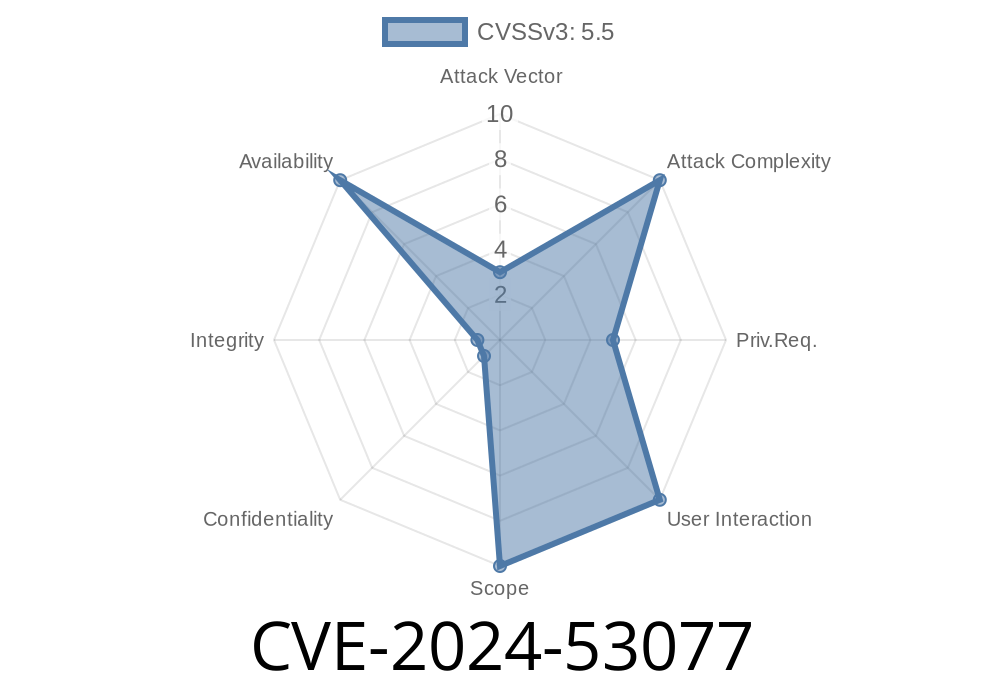A new vulnerability, CVE-2024-53077, was discovered and quickly patched in recent Linux kernel releases. This vulnerability stems from improper management of memory tied to the xarray structure in the rpcrdma (Remote Procedure Call over RDMA) subsystem, used when the kernel communicates efficiently with networked storage and remote servers. The bug could result in a subtle memory leak, impacting long-term server stability, especially in systems that repeatedly add and remove RDMA devices.
In this long read, we'll break down what happened, review the actual patch, provide references, and show what an exploit scenario might look like, even though no direct code execution is involved. We'll keep this straightforward and accessible for system administrators and developers.
Background
In the Linux kernel, the rpcrdma module allows high-performance networking via RDMA (Remote Direct Memory Access). This module maintains an xarray (a dynamic data structure for object storage) for each device in an rpcrdma_device struct to manage its resources.
The lifecycle for such a device looks like this
- When a new RDMA device is detected, rpcrdma_add_one() is called, initializing the xarray with xa_init_flags().
- When a device is removed, rpcrdma_remove_one() is called, which should release all memory associated with the xarray using xa_destroy().
The Flaw
Before the fix, the code initialized the xarray for each new device, but forgot to destroy (clean up) it when the device was removed. Over time, this would result in the kernel leaking small blocks of memory with each add/remove operation — accumulating and potentially destabilizing servers that hot-plug devices or frequently restart related services.
This issue was highlighted by Dai, and quickly patched by the kernel maintainers.
The Patch
The fix is surprisingly simple: add a call to xa_destroy() in the device removal path.
Before
// File: net/sunrpc/xprtrdma/transport.c
void rpcrdma_add_one(struct ib_device *device) {
// ... other setup ...
xa_init_flags(&new_dev->resources, XA_FLAGS_ALLOC);
// ... more code ...
}
void rpcrdma_remove_one(struct ib_device *device) {
// Forgot to destroy the xarray!
// No xa_destroy() here
// ... other cleanup ...
}
After
// File: net/sunrpc/xprtrdma/transport.c
void rpcrdma_remove_one(struct ib_device *device) {
struct rpcrdma_device *rdev = ib_get_client_data(device, rpcrdma_client_id);
if (!rdev)
return;
/* Properly release xarray memory */
xa_destroy(&rdev->resources);
// ... other cleanup ...
}
Source Reference:
- Kernel commit with the fix
- Patch discussion on mailing list
Who’s at Risk?
- Systems using NFS over RDMA or any applications depending on the Linux kernel's xprtrdma transport on modern kernels.
What Can Happen
This is not a direct remote or local code execution bug — but a resource exhaustion one. Over a long period, servers that routinely add/remove RDMA-capable devices or restart RDMA services could gradually leak memory. Eventually, the available system memory drops, causing performance issues or system failures.
Pseudo-Exploit Example
Here’s a basic illustration of how a malicious user or faulty automation could exploit this leak in unpatched kernels:
#!/bin/bash
# WARNING: This is for demonstration only — do not use on production!
for i in {1..10000}; do
echo "Simulating RDMA device add/remove cycle #$i"
# Simulate device hotplug (real code would use udev or kernel APIs)
modprobe rdma_rxe # Load the RDMA module
sleep .2 # Give it a moment
rmmod rdma_rxe # Unload the RDMA module
done
# After enough cycles, system memory starts running low due to lost allocations!
You won’t see gigabytes lost immediately — but over days, weeks or months on busy systems, this adds up.
You’re running a Linux kernel *before* the patch (v6.10-rc4 or newer have it), and
- You use RDMA/NFS features.
Check your kernel version
uname -r
Applying the Fix
1. Upgrade your system kernel to at least v6.10-rc4 or a distro release known to have backported the patch.
2. If you custom-build the kernel, check for this fix in your tree (git log -p net/sunrpc/xprtrdma/transport.c | grep xa_destroy).
Distro patch references
- Red Hat Bugzilla tracking
- openSUSE Patch
- Ubuntu Launchpad
Conclusion
- CVE-2024-53077 is a silent but serious bug for anyone relying on Linux's RDMA/NFS infrastructure.
Further Reading
- Linux xarrays documentation
- Linux NFS/RDMA mailing list
If you have any concerns about your deployment, it’s recommended to monitor memory usage and schedule a kernel update as soon as practical.
Stay patched, stay safe.
*— Linux Security Watch*
Timeline
Published on: 11/19/2024 18:15:27 UTC
Last modified on: 12/19/2024 09:38:34 UTC
